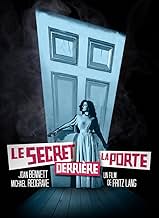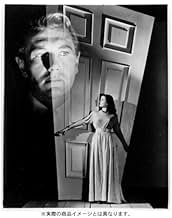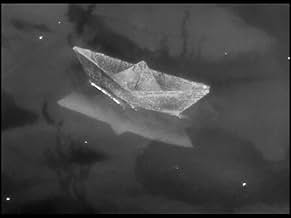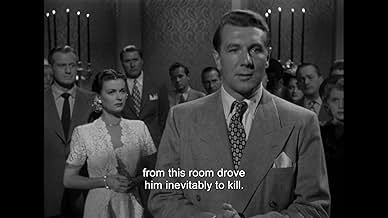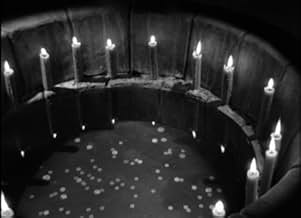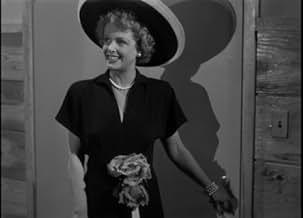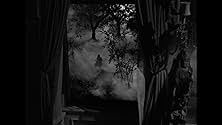Uma rica herdeira de Nova York viaja para o México e se apaixona por um arquiteto, com o qual se casa imediatamente, mas surpresas desagradáveis a aguardam quando ela vai viver na mansão que... Ler tudoUma rica herdeira de Nova York viaja para o México e se apaixona por um arquiteto, com o qual se casa imediatamente, mas surpresas desagradáveis a aguardam quando ela vai viver na mansão que ele projetou e construiu na costa Leste.Uma rica herdeira de Nova York viaja para o México e se apaixona por um arquiteto, com o qual se casa imediatamente, mas surpresas desagradáveis a aguardam quando ela vai viver na mansão que ele projetou e construiu na costa Leste.
- Direção
- Roteiristas
- Artistas
- Altar Boy
- (não creditado)
- Townsman
- (não creditado)
- Sarah
- (não creditado)
- Guest in Home Tour
- (não creditado)
- Guest in Home Tour
- (não creditado)
- Judge
- (não creditado)
- Small Mexican Knife Fighter
- (não creditado)
- Country Squire
- (não creditado)
- Direção
- Roteiristas
- Elenco e equipe completos
- Produção, bilheteria e muito mais no IMDbPro
Avaliações em destaque
After a whirlwind romance, Celia Barrett (Bennett) marries Mark Lamphere (Redgrave) but finds once the honeymoon is over his behaviour becomes quite odd...
A troubled production and troubling reactions to it by the critics and Lang himself! Secret Beyond the Door is very much in the divisive half of Lang's filmic output. Taking its lead from classic era Hollywood's keen interest with all things Freudian, and doffing its cap towards a number of "women in peril at home" films of the 1940s, it's a picture that's hardly original. Yet in spite of some weaknesses in the screenplay that revolve around the psychological troubles of Mark Lamphere, this is still a fascinating and suspenseful picture.
I married a stranger.
Draped in Gothic overtones and astonishingly beautiful into the bargain, it's unmistakably a Lang film. His ire towards the cast and studio, where he was usurped in the cutting room and with choice of cinematographer, led Lang to be very dismissive towards the piece. However, it contains all that's good about the great director. Scenes such as the opening involving a paper boat on ripples of water, or a sequence that sees Mark dream he is in a courtroom full of faceless jurors, these are indelible images. Then there's the lighting techniques used around the moody Lamphere mansion that are simply stunning, with Cortez (The Night of the Hunter) photographing with atmospheric clarity.
Blades Creek, Levender Falls.
Elsewhere the characterisations are intriguing. Mark is troubled by something and we learn it's about women in his life, while his "hobby" of reconstructing famous murder scenes in the rooms of the mansion, is macabre and really puts a kinky distortion in the narrative. Celia marries in haste but is surprisingly strong, her character arc given heft by the fact we think she may well be prepared to die for love. Then there's the house secretary, Miss Robey (O'Neil), a shifty woman with a headscarf covering an unsightly scar on one side of her face, and Mark's young son David (Mark Dennis) who is cold and detached and has some disturbing theories on his father's means and motivations.
Lilacs and locked doors.
Cast performances are not all top grade, and even though Redgrave doesn't push himself to required darker territories, the performances are involving and worthy of the viewer's undivided attention. Rózsa's musical score is a cracker, deftly switching from the romantic swirls that accompany Mark and Celia during their love courting, to being a stalking menace around the Lamphere house and misty grounds when danger and psychological distortion is near by. Technically it's a remarkable movie, where even allowing for some daftness involving the psychobabble, it's a picture that Lang fans can easily love. There are those who detest it, very much so, but if it does hit your spot it will get inside you and stay there for some time afterwards. 8/10
Being the 40's the Freudian overtones are overpowering, as the husband, Michael Redgrave in his first Hollywood role, seems to be over-reacting to years of unhealthy female influence and dominance in his life as his mood swings like, well, I guess you'd say, a door.
In the background there's an apparently disfigured housekeeper Miss Robey, Redgrave's supportive sister and his difficult, moody son but the main tension is between the leads as it builds gradually to a fiery ending.
The plot may creak at times like an old floorboard, Redgrave and Bennett are somewhat stiff and cold in their parts and the continuity isn't all it could be, but if like me you like film noir settings then this is for you too. Thus we get Bennett's interior monologues, lots of shots of her in front of mirrors, lots of scenes with darkened doors and symbolic keys, and even a shroud-like mist followed by a thunderstorm on the climactic night. There are some great shots of starkly-lit corridors and a wonderfully imaginative dream sequence (yes, it has those too) of Redgrave's where he's prosecuting himself in front of a judge and jury whose faces are in shadow. Dmitri Tiompkin's atmospheric score adds a lot to the overall mystery and dread, particularly at the end.
This may not be Lang's best American film but there was more than enough in it to keep an avowed fan like me keenly watching.
Fritz Lang's bleak cinematography and haunting use of music help to create the atmosphere that a story of this nature needs in order to work effectively. The focus on the door helps to create the tension as to what the secret is throughout the movie, and Fritz Lang seems keen to capitalise on that as we see Joan Bennett's narration change from how she feels personally to driving herself crazy as she tries to decipher what's behind the door. The characters in the story are interesting, and they need to be as this film is mostly character based. We follow Celia Lamphere, and we are given her thoughts by way of the aforementioned narration. Narration is often found in scripts that have been written by people that don't know how to write good scripts. However, in this case it actually helps the film to move along. In order for the story to work, we need to know what the character is feeling, so in this case narration is helpful to the story.
As I've mentioned, the ending isn't all that good, but the suspense builds nicely and there's much to like about this film. If you're new to Fritz Lang, though, I certainly recommend the classics 'M' and 'Metropolis' before this, and also from his American films; 'Fury', 'Scarlet Street', 'Beyond a Reasonable Doubt' and 'While the City Sleeps' get my thumbs up.
What lies in room no.7? It is permanently locked and becomes Celia's object of curiosity. Also in the house are 3 slightly spooky other characters - Redgrave's sister Caroline (Anne Revere), his son David (Mark Dennis) from a previous marriage and his secretary Miss Robey (Barbara O'Neil). Its a good film, but I think if I was a woman I would have left him pretty early on in the relationship! While I could see where the film was heading, the actual ending is not what I expected. It's a spookily filmed story and it's quite memorable.
Why would Joan marry and stay with someone so utterly stiff and charmless as Michael Redgrave?? The male lead should have been given to someone more mysterious and attractive. They were hoping for a new Laurence Olivier...
Joan is a treat as always. I love how she comes across as a spoiled debutante who can hardly care to utter her lines with any conviction. She´s a good actress -just a bit too laid back at times. I love her, she is so stunningly beautiful and cool in her Hollywood wardrobes.
I love the whole atmosphere of the movie. It´s slow at first and then from the honeymoon in Mexico and forward so mysterious! I love her bedroom with the tapestry! The thing with the room-collecting was quite farfetched but fun. Who would REALLY aquire complete scenes of murders at home???? I´m going to see it again soon and learn some lines. They don´t make them like they used to!
Você sabia?
- CuriosidadesThe grove of trees through which Celia (Joan Bennett) runs when she flees the house is the same grove through which the Wolf Man ran in O Lobisomem (1941), also made by Universal. In particular, the tree, against which she leans, is the same one under which the Wolf Man was beaten.
- Erros de gravaçãoWhen Celia takes an impression of the key in wax, she only takes the impression on one side, which would render the key made from that impression useless without the reverse side.
- Citações
Mark Lamphere: You were living that fight. You soaked it all in - love, hate, the passion. You've been starved for feelings - any real feelings. I thought: 20th Century Sleeping Beauty. Wealthy American girl who has lived her life wrapped in cotton wool but she wants to wake up. Maybe she can.
Celia Barrett: Is it as hard as all that?
Mark Lamphere: Most people are asleep.
- ConexõesFeatured in Vampira: Secret Beyond the Door... 1947 (1956)
Principais escolhas
- How long is Secret Beyond the Door...?Fornecido pela Alexa
Detalhes
- Data de lançamento
- País de origem
- Idiomas
- Também conhecido como
- O Segredo da Porta Cerrada
- Locações de filme
- Empresa de produção
- Consulte mais créditos da empresa na IMDbPro
Bilheteria
- Orçamento
- US$ 1.500.000 (estimativa)
- Tempo de duração1 hora 39 minutos
- Cor
- Proporção
- 1.33 : 1
Contribua para esta página


